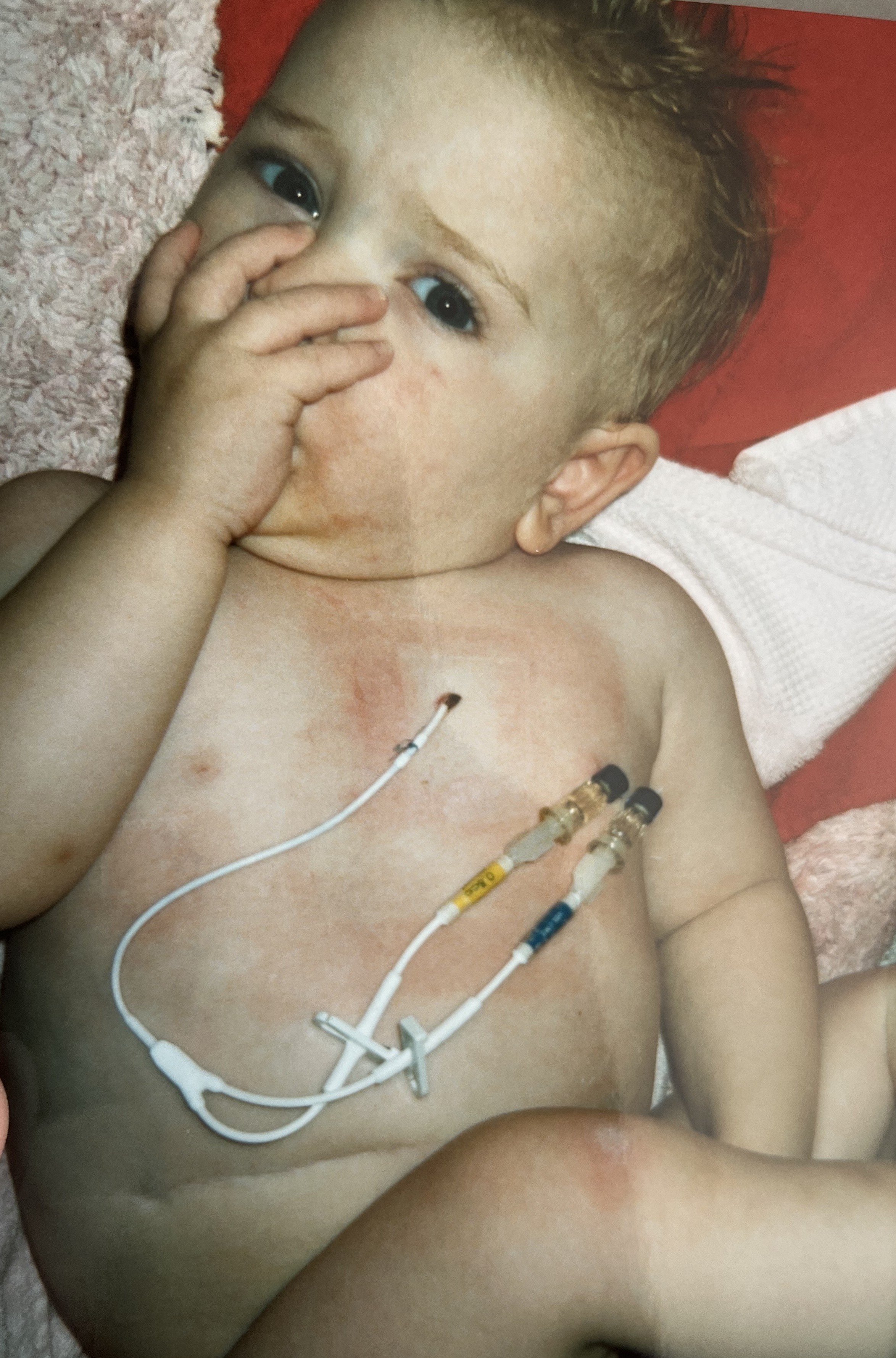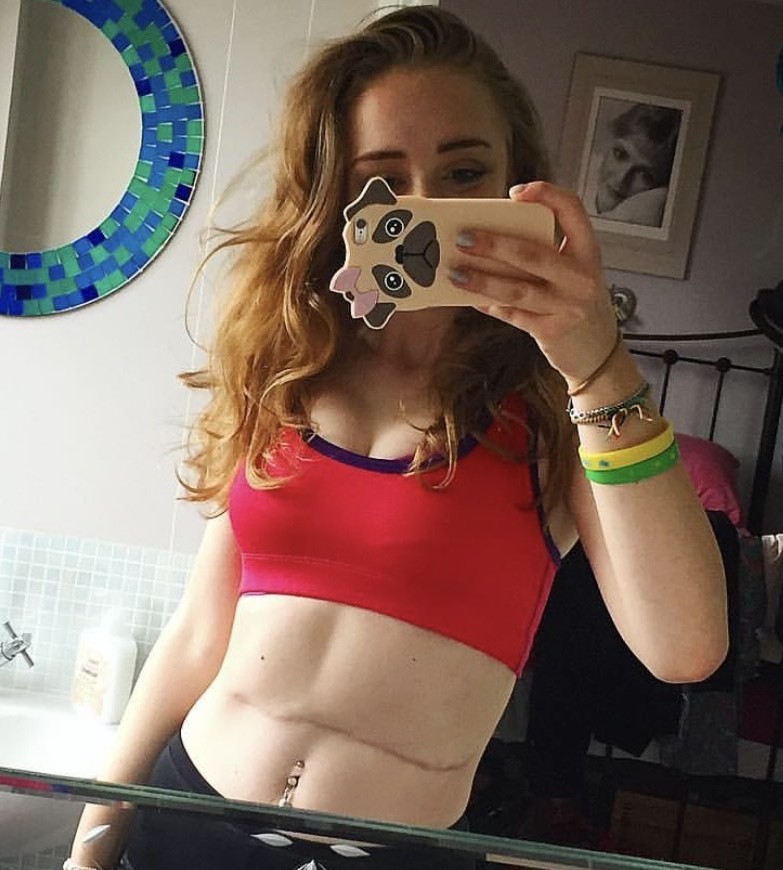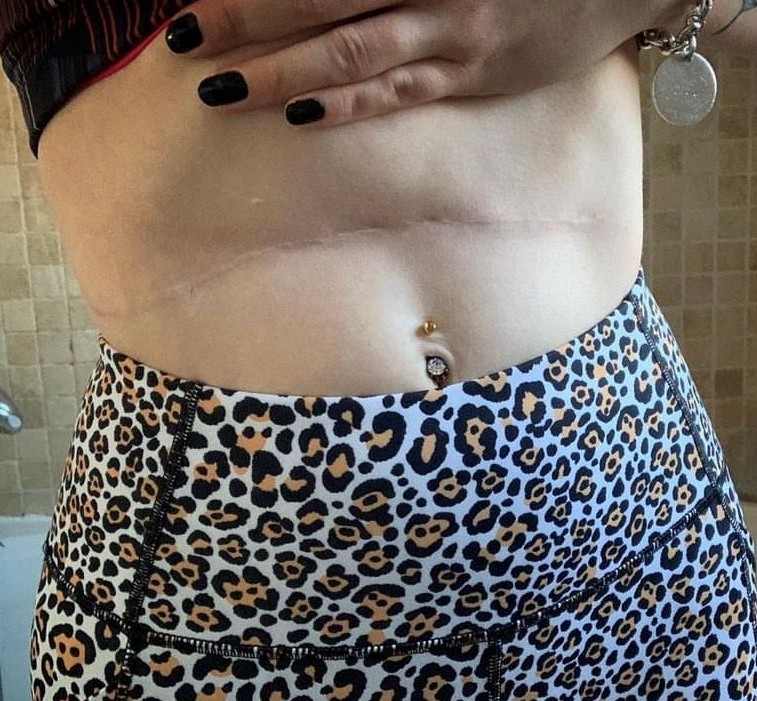
Living with a scar is something which many of our young people share. When we recently published our blog on this topic Emily got in touch and we’re very grateful for her honest account of living with a scar which she shares with us here.
Although I’ve shared my story before I didn’t particularly talk about my scar, but I think it’s important that we do discuss scars because that’s how we can help each other.
I had my transplant as a baby, so I have grown up with my scar and was aware of it from a young age. When I was around four or five, my parents explained that I had my scar because I had a ‘special liver’ that’s not like anyone else’s. I understood that I had to look after it and this meant strict hygiene, being careful of being around ill people as I had a lower immunity and also to be careful with how many treats I had. My parents were always honest, and I think that’s important. Children are very intuitive; if they’re not told, they will find out.
When I would change for PE, I was the only one in class that had a scar. A big scar. The other children would ask me questions all the time. What happened to you? Why are you always going to hospital having check-ups? Why are you always ill from something? I can understand why they asked this. If it wasn’t chicken pox, it was a stomach bug, or some kind of flu. I had a weak immune system and was always getting something.
However, I think I took all these questions in my stride, and I coped with having a scar very well at a young age, I did what I was told. I had my blood tests, I went to the doctors for many different appointments. I trusted that my mum and dad knew how to look after me and I although I didn’t understand why I was the way I was, I just knew I was different. It didn’t bother me much. I was more upset about missing school frequently and struggling academically as I missed so much school due to my weak immune system.

However, when I was a teenager and I went to secondary school, it affected me much more. I’d be lying if I said I didn’t. It was apparent that I had no control over what happened to me from a young age. It’s very difficult having things decided for you and you just have to do it. People would always tell me, ‘You’re so lucky you had this when you were young and you can’t remember it’. Or: ‘Your poor parents having to go through that’. All I can say is that this is the wrong thing to say to a child, teenager and an adult. I’ve had these comments from when I was a little child to now as an adult trying to live her life in her 20’s. I don’t know my life without my scar, I don’t know my life without cancer or a transplant. I don’t know what a ‘normal life’ is.
For years, I would worry that my cancer would come back, I could get a different cancer, I could go into rejection. I have had to take medication that keeps me alive. I would worry that I wouldn’t make it through secondary school because I would get ill again. I was scared of dying as I’ve faced life or death situations from a young age. I do remember times when I was ill. I remember asking for mum when I was in hospital and I couldn’t see her, I remember snippets of being in hospital but I don’t know what for. I will never know a life that wasn’t revolved around a hospital as a child.
And of course, my scar was a very clear physical reminder of all of this, and I would worry that it would affect my relationships and prevent me from meeting someone. The scar is big, and it pulled as it was attached to two layers of muscle. I would have to cope with people gasping when they saw it, I felt as if everyone was staring at me when I would go swimming, or if I was getting changed in a changing room at school or the gym. I would be paranoid about being laughed at, judged. I would try and cover it up when I could. I went through every emotion, and I really struggled mentally with living with my scar and my medical condition, for example people telling me that I wouldn’t be able to have fun as I have to be careful with alcohol consumption. I think it’s vital that people are honest about how they felt growing up with a scar. It does affect you and when I was a teenager, I have to admit I hated it.

Emily pictured with her partner, Danny, just before doing a sky dive!
But I’m here to say that it does get better. I’m now 26 and I’ve completely changed my mindset about it. I’ve grown up, I’ve matured and I’ve been able to learn how to cope living a with a life-changing medical condition. I have been through a significant amount and I’m very proud of my scar now. I want people to know that you should never be ashamed of the way you look. Growing up with social media and how a ‘body should look like’ can be very toxic, but it’s not real. I wish I could tell my younger self, as there was nothing wrong with me then and I know that now. I’m very lucky that I have a supportive family, friends and the most amazing partner that has helped me love my scars and to be proud of them, as people should be. They highlight everything you’ve been through and survived.
I did have surgery on my scar when I was 18 to neaten it, as it was attached to two layers of muscle. I was opened up many times as a child. Knowing my parents were waiting to hear whether my cancer had spread and whether that would be the end of my treatment or if they could cure my cancer was difficult to hear but it motivates me now not to drink alcohol and to do what I can to look after my body.

My advice to any person who lives with a scar is to be proud of it and look after your body. It has fought so hard to be here. But it’s okay to take some time to adjust to any change or to need time to learn to live with these changes. It doesn’t come straight away and you need time. There’s no time frame, that’s within your control and it’s your decision. Anyone that makes you feel bad about your appearance is not worth your time or breath. They should be proud of you and love you for how you are. With or without a scar or treatment. Please look after your body as it’s precious.

